Suzuki Global Environment Charter
Suzuki Global Environment Charter (Established in 2002 and revised in 2006)
Environmental Concept
In order to hand over our beautiful Earth and affluent society to the next generations, we must all realize that the actions of each and every one of us have a great effect on our Earth’s future, so we must make every effort to preserve our environment.
Basic Environmental Policies
- Strictly observe environmental laws and also follow our own standards.
- Actively reduce the environmental impact resulting from our business activities and products.
- Maintain and continually improve upon our environmental management system.
- Actively promote environmental communication.
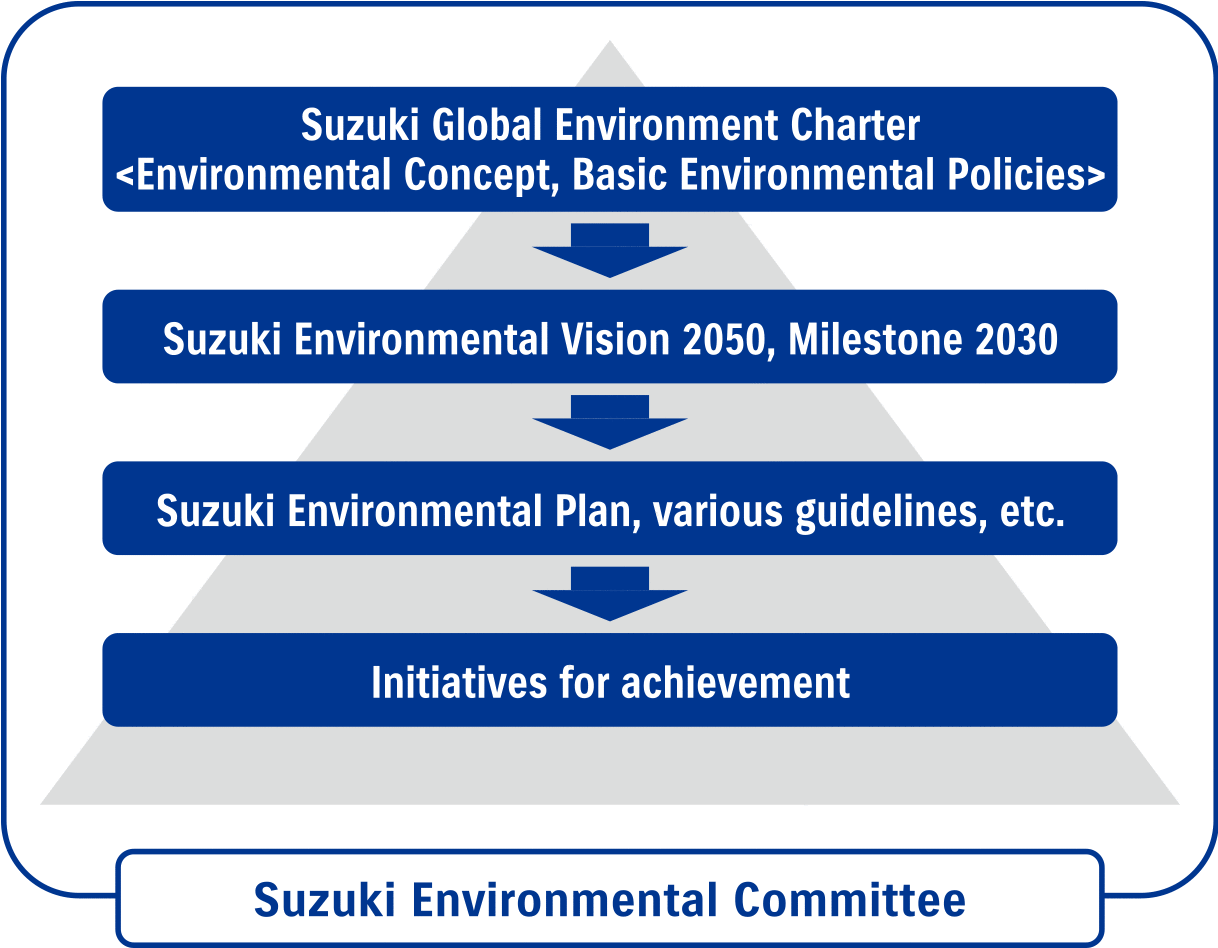
Suzuki Group environmental organization
Suzuki has established the Committee for Carbon Neutrality and the Suzuki Environmental Committee, which are executive and business operations committees, directly under the Board of Directors for the purpose of environmental management for the entire Group.
The Board of Directors instructs and supervises the Committee for Carbon Neutrality and the Environmental Committee, and makes final decisions based on the reports from both committees.
The Committee for Carbon Neutrality focuses on the theme of climate change (carbon neutrality) and holds intensive monthly deliberations on decarbonization so the committee can operate more flexibly.
The Suzuki Environmental Committee meets twice a year to discuss environmental management for the entire Company.
The themes of the two committees are clearly distinguished to enhance the effectiveness of meetings and further accelerate decision-making related to decarbonization.
(As of April 2024)
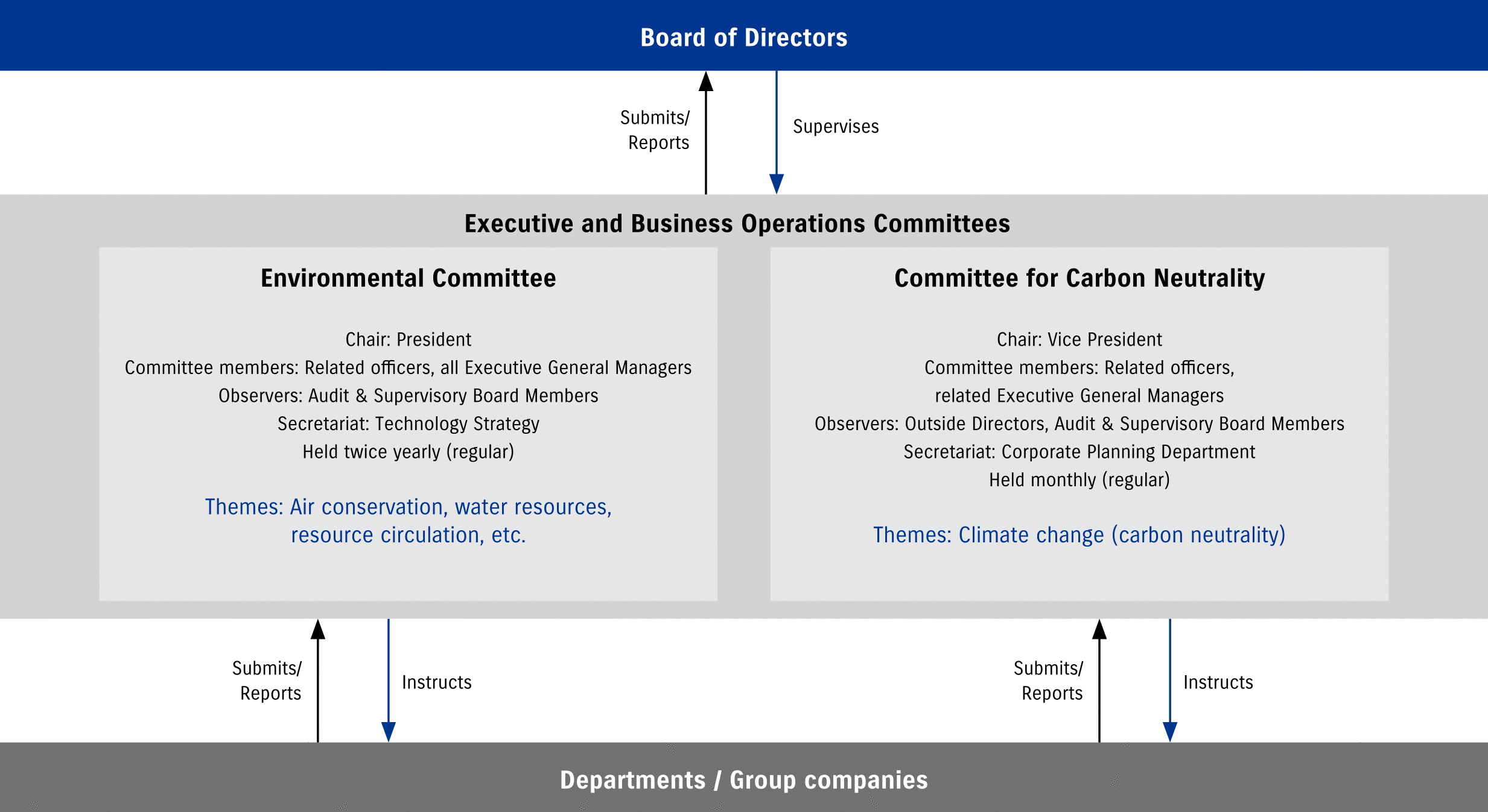
Suzuki Environmental Vision 2050 —Smaller, Fewer, Lighter, Shorter, Beauty—
“Smaller, Fewer, Lighter, Shorter, Beauty”: these are the words which Suzuki has held since the early 1990s to express the basis of its manufacturing. We believe that this concept also applies to the initiatives toward tackling global environmental issues including climate change, water shortages, and resource depletion.
On the occasion of the Company’s 100th anniversary in 2020, we have set the Suzuki Environmental Vision 2050 as a compass toward 2050, in order to “contribute to society and become a company loved and trusted throughout the world” for the next 100 years.
Based on the “Smaller, Fewer, Lighter, Shorter, Beauty” concept, Suzuki will aim to realize our ideal future. That is, to make the environmental impact from our business activities smaller and fewer, make the environmental load lighter, shorten the time it takes to tackle various environmental issues, and keep the earth bountiful and beautiful.
Overall image of Suzuki’s environmental strategy
Suzuki has formulated a Suzuki Environmental Plan every five years to promote environmental initiatives and ensure continuous improvement through the plan-do-check-action (PDCA) cycle.
Toward achieving the Suzuki Environmental Vision 2050 and Milestone 2030, we will continue to promote our initiatives by setting short-term targets through backcasting.
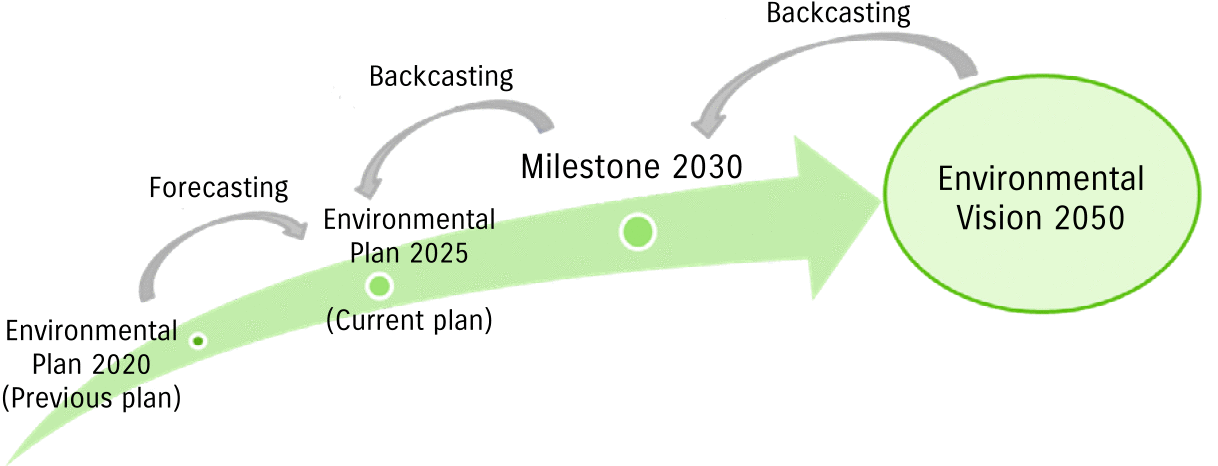
■ Suzuki’s environmental targets
| Theme | Short-term target | Medium-term target | Long-term target | ||
|---|---|---|---|---|---|
| Climate change | Carbon Neutral (Suzuki’s Growth Strategy for FY2030) | Products | First launch of battery EVs (Automobiles) First launch in Japan in FY2023, then first launches in Europe and India in FY2024 (Motorcycles) First launch for small and mid-sized motorcycles in FY2024 (Outboard motors) First launch in FY2024 |
Introduce multiple battery EVs (Automobiles) Expand to six models in Japan, five models in Europe and six models in India by FY2030 (Motorcycles) Expand to eight models by FY2030 (Outboard motors) Expand to five models by FY2030 |
Achieve carbon neutrality
|
| Manufacturing | Reduce CO2 emitted from the painting plant of Kosai Plant by 30% compared to FY2016 by FY2025 | Carbon neutrality of plants
|
|||
| Suzuki Environmental Plan 2025 | Milestone 2030 | Suzuki Environmental Vision 2050 | |||
| Product CO2 | CO2 emitted from products (Automobiles) Reduce by 30% compared to FY2010 (Motorcycles) Reduce by 15% compared to FY2010 (Outboard motors) Reduce by 15% compared to FY2010 |
|
|
||
| CO2 emitted from business activities | Reduce CO2 from business activities (Production activities) Reduce by 25% compared to FY2016 (Logistics activities, etc.) Reduce CO2 emission per sales unit by 9% compared to FY2016, etc. |
|
|
||
| Air conservation |
|
|
|
||
| Water resource conservation | Water resource conservation (Production activities)
|
|
|
||
| Resource circulation |
|
|
|
||
Environmental plan
Suzuki Environmental Plan 2025
In order to hand over our beautiful earth and affluent society to the next generations, Suzuki established the Suzuki Environmental Plan 2015 in FY2012 and the Suzuki Environmental Plan 2020 in FY2016 and has been striving to accomplish them based on the Suzuki Global Environment Charter. We have established the new Suzuki Environmental Plan 2025 from FY2021 and are working towards the realization of the Suzuki Environmental Vision 2050 and Milestone 2030.
Suzuki takes the environmental impact of its business and other activities very seriously. We consider it a top priority to develop eco-friendly products and promote business activities that reduce environmental impact. For the next 100 years, we will continue to contribute to society and strive to accomplish the Suzuki Environmental Plan 2025 as Team Suzuki, which includes both domestic and overseas affiliates, in order to continue as a sustainable company.
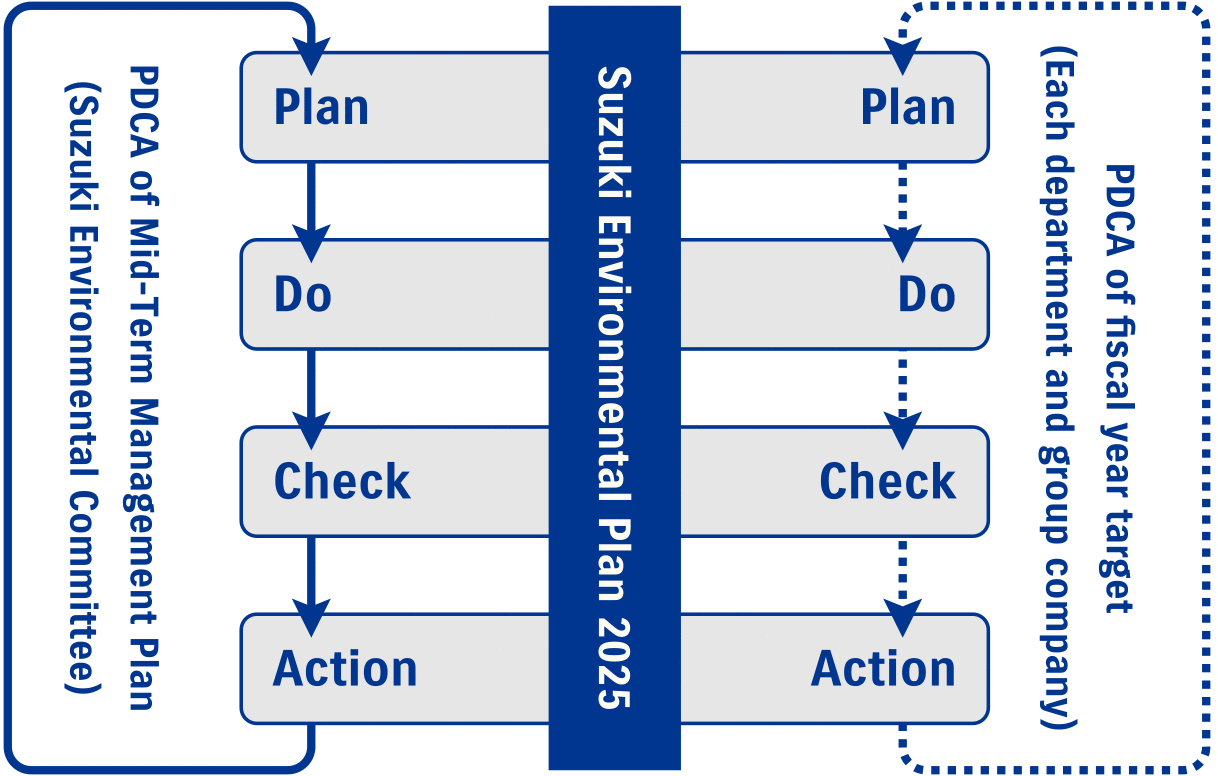
| Category | Subcategory | Concrete implementation/target | Major achievements in FY2023 |
|---|---|---|---|
| Climate change | Reducing CO2 emissions from products |
[Automobiles]Reduce by 30% compared to FY2010 |
Reduced by 26.5% compared to FY2010 (global average) |
[Motorcycles]Reduce by 15% compared to FY2010 |
Reduced by 14.0% compared to FY2010 (per unit sales) | ||
[Outboard motors]Reduce by 15% compared to FY2010 |
Reduced by 15.0% compared to FY2010 (per unit output) | ||
| Reducing CO2 emissions from business activities |
[Production activities]Reduce by 25% compared to FY2016 |
[Overall]Reduced by 24.1% compared to FY2016 (0.255 t-CO2 per unit) [Overseas]Increased by 2.4% compared to FY2016 (0.289 t-CO2 per unit) [Japan]Reduced by 62.0% compared to FY2016 (0.177 t-CO2 per unit) |
|
[Development, sales, and other activities]Proactively promote energy-saving activities toward achieving carbon neutrality, including introduction of energysaving equipment and solar panels |
|
||
[Logistics and other activities]
|
|
||
| Air conservation | Increasing the use of renewable energy |
[Production activities / Non-production activities]Promote the introduction of renewable energy, including solar power |
Installed solar power generation systems at 10 domestic subsidiary distributors |
| Controlling air pollution |
[Automobiles / Motorcycles / Outboard motors]Contribute to the improvement of air quality through the introduction and diffusion of clean products suited to each country and region’s situation |
[Automobiles]
|
|
[Motorcycles]
|
|||
[Outboard motors]
|
|||
| Reducing VOCs |
[Automobiles]Reducing VOCs in car interiors |
Achieved lower vehicle interior VOC concentration than the target value voluntarily set by Japan Automobile Manufacturers Association, Inc. in the new Swift and new Spacia | |
[Production activities]Reduce VOCs in the painting process at plants in Japan |
Reduced by 38% compared to FY2000 Toward FY2025, worked to achieve the target by introduction of water-based paints at a new plant, etc. |
||
| Water resources | Water resource conservation |
[Production activities]<Water consumption>
<Water quality>
|
|
| Resource circulation | Promotion of environmentally conscious design |
[Automobiles / Motorcycles / Outboard motors]Continue to undertake development and design that give consideration to recycling
|
[Automobiles]
|
[Motorcycles]
|
|||
[Outboard motors]Adopted thermoplastic resin for the material that covers the engine on the DF70A-100B, 2024 model |
|||
| Promotion of automobile recycling |
[Automobile recycling system]
|
|
|
| Promotion of 3Rs (reduce, reuse, and recycle) for batteries |
[Used lithium-ion batteries]
|
|
|
| Waste reduction |
[Production activities]
|
Continued proper disposal of industrial wastes | |
| Reduction of plastic packaging materials |
[Logistics, sales, and other activities]<Packaging materials>Promote reduction of the use of plastic packaging materials, especially for outboard motors, to prevent discharge of plastics into the ocean <Marine>Promote the three pillars of the Suzuki Clean Ocean Project (waterside cleanup activities, activities to eliminate the use of plastic packaging materials, and activities to collect marine microplastics) globally in the field of outboard motors |
<Packaging materials>
<Marine>Implemented the three pillars of the Suzuki Clean Ocean Project: the Clean-Up the World Campaign, reduction of plastic packaging materials, and activities to collect marine microplastics |
Introduction of environmental management system
Suzuki is promoting the introduction of ISO 14001 as part of environmental conservation efforts. ISO 14001 is an international standard for environmental management systems. By obtaining ISO 14001 certification, Suzuki intends to comply with environmental laws and regulations and reduce environmental impact.
Suzuki has already completed acquiring ISO 14001 certifications at sites accounting for 94%* of all Suzuki Motor Corporation and Suzuki Group plants of domestic and overseas manufacturing subsidiaries combined (sites that account for over 99% of its CO2 emissions from global production).
* Of the 33 plants of 20 companies, 31 plants of 18 companies have acquired certification.
In April 1998, Magyar Suzuki became the first in the Suzuki Group to acquire ISO 14001 certification. By March 2003, all domestic plants of Suzuki had acquired ISO 14001 certification. Among domestic manufacturing subsidiaries, all nine plants of four companies have acquired ISO 14001 certification. Overseas, 17 plants of 13 manufacturing subsidiaries have acquired ISO 14001 certification, as well as 2 plants of 2 affiliates.
In January 2023, we acquired ISO 14001 certification for our head office, including offices and development areas. Also, at domestic offices and development sites, etc., we will steadily promote the introduction of ISO 14001. In addition, at the head office, we are strengthening initiatives for the environment by conducting two sets of audits each year, an external audit by an auditing organization and an internal audit.
What’s more, at Group domestic sales companies, to support the environmental initiatives conducted autonomously by these companies, we send out a checklist once a year that covers the initiatives for the latest environmental regulations, energy savings, and environmental impact reduction. At Team Suzuki, we share an awareness of legal compliance and environmental initiatives.
■ ISO 14001-certified: Suzuki and its domestic consolidated subsidiaries
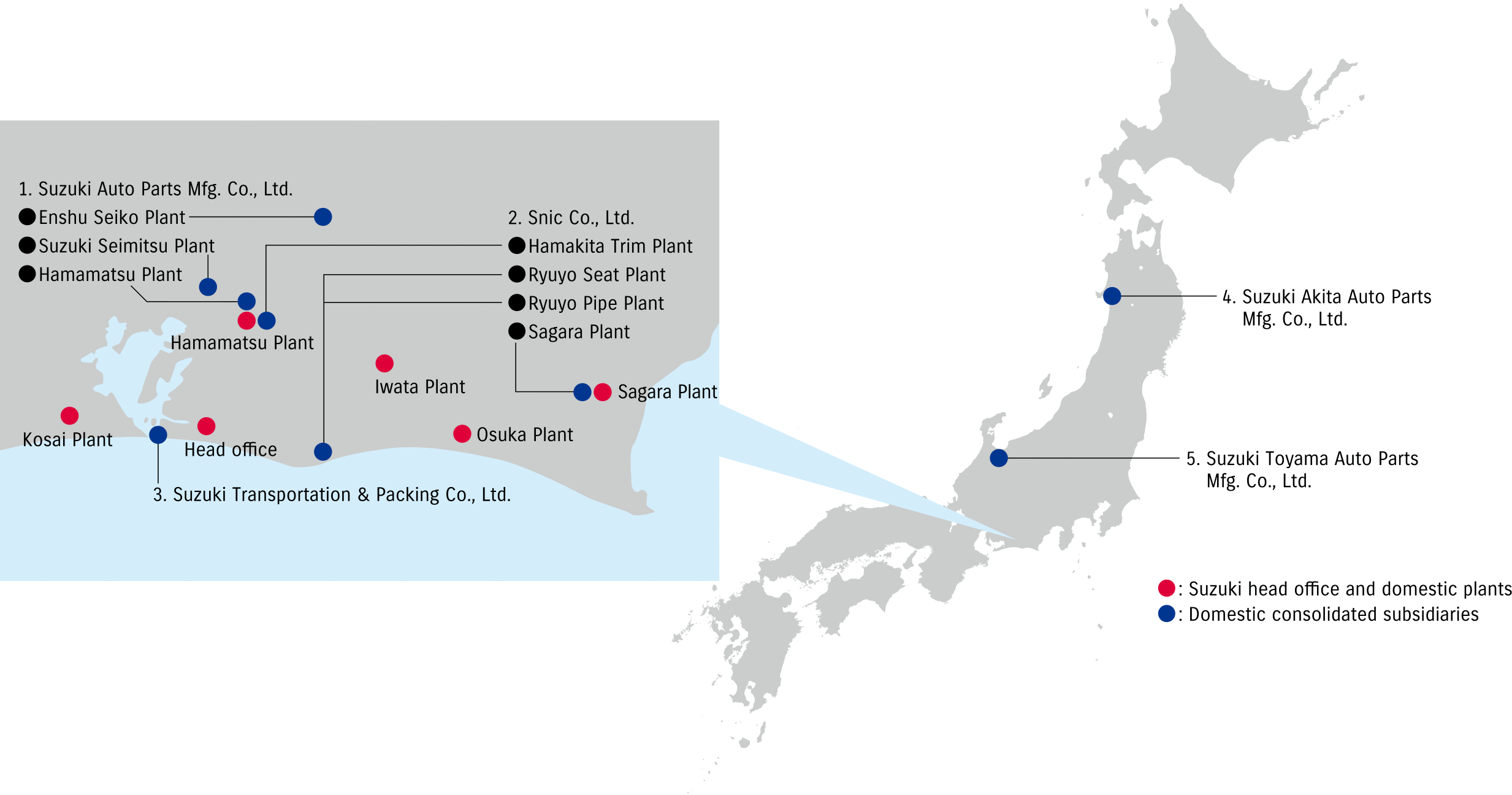
■ ISO 14001-certified: Overseas consolidated subsidiaries and affiliates
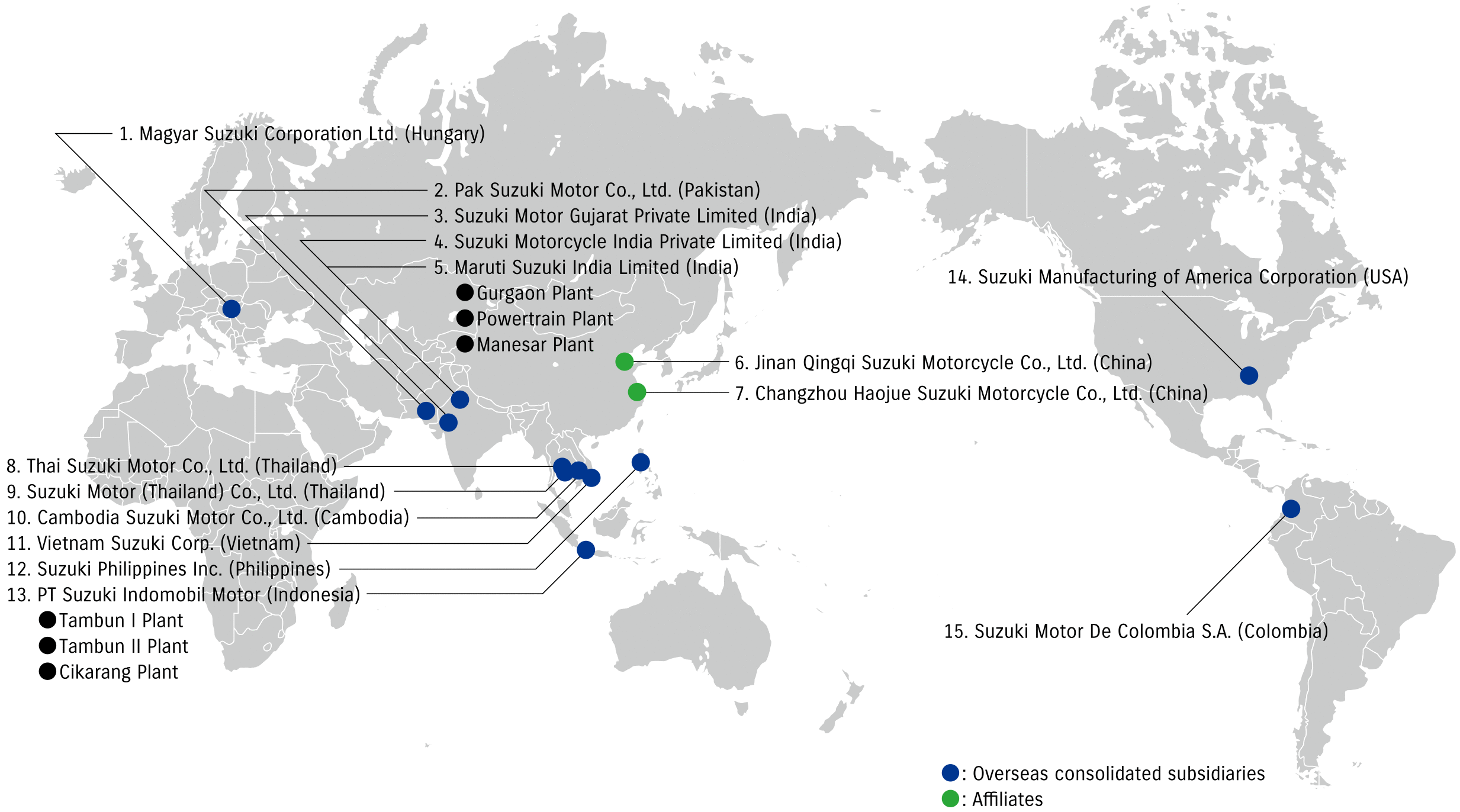
Environmental education/awareness
Employee education
As part of our employee education program, we integrate basic environmental education on Suzuki’s Environmental Concept and policies, environmental issues, and promotion of eco-driving into new employee education. We also provide environmental education according to respective operations and positions. Each of our domestic plants works to prevent environmental accidents by providing various types of education on their own, mainly for employees in charge of environmentally important processes, as well as introductory education for new employees and education for managementlevel employees and all employees.
Training for those in charge of procurement
In order to raise environmental awareness and perform procurement operations appropriately, we conduct training for new employees in the procurement department and employees transferred from other departments. We promote procurement activities that comply with environmental laws and regulations and make sustainable development possible.
Situation concerning environmental laws and regulations
In FY2023, there were 8 cases of significant spills* and 3 cases of complaints concerning the environment, all of which were properly taken care of. There was no administrative guidance or payment of penalty due to these significant spills.
- [Scope of aggregation]
- Head office, Iwata Plant, Kosai Plant, Osuka Plant, Sagara Plant, Hamamatsu Plant
- * Significant spills: Spills that are recorded as spills from an organization, such as wastewater, emission gas, odors, chemical substances (including oil), and wastes that exceed law and regulation limits, as well as soil and groundwater contamination.
Communication with business partners
Communication and briefing sessions with business partners
In managing substances of concern for automobiles consisting of many parts, it is important to communicate information on chemical substances in products and regulated substances throughout the supply chain.
Suzuki regularly holds online briefings for its business partners on how to enter information on chemical substances into IMDS (International Material Data System), a tool for communicating such information, and on global trends for substance regulations.
The accurate entry of data into IMDS is necessary to check for the presence of regulated substances. In addition, when flame retardants and plasticizers contained in parts are regulated, it is important to communicate information on regulations before they take effect because it takes time to conduct development tests to substitute alternative substances.
Please refer to Chemical Substances for details on IMDS.
Request for cooperation in continuously reducing risk
To continuously undertake transactions with business partners and deepen mutual understanding with them in implementing green procurement, Suzuki requires both new and existing business partners to submit the SOC Control System Self-Check Sheet (a survey form on the status of establishing a management system for substances of concern).
We also ask new business partners to make improvements if we find any issues based on their responses on the check sheet for selecting partners. We ask existing business partners to implement a yearly self-check and submit the results when requested by Suzuki. For business partners we deem to be not meeting the standards based on their responses, as well as those who could be in violation of the Suzuki Green Procurement Policy, Suzuki performs audits on the status of establishing management systems for substances of concern. If any items are found, Suzuki requests that they take corrective or preventative measures to reduce the risk.
- Note: Audits of business partners are systematically implemented regardless of whether there are any problems.
Measures against violation of laws and regulations
If a violation of laws and regulations occurs in the business activities of our business partners that is expected to affect Suzuki or society, we request an immediate report to Suzuki, an investigation into the cause, and a report on the investigation results. In addition, we also request they submit measures to prevent recurrence.
Community information exchange meeting
We carry out an information exchange meeting with local residents to ask their views and opinions to reduce environmental impact. Although meetings have been postponed for the past few years to prevent the spread of COVID-19, some have been resumed from FY2022, depending on the situation.
Information disclosure
In order to spread awareness and understanding of our environmental initiatives among our stakeholders, we disclose our environmental technologies online, in booklets and other media, and through participation in environment-related exhibitions and events.

Website

A snapshot taken at an event
Participation in outside associations, etc.
Cooperation with various economic and industry associations
Suzuki is a member of associations such as the Japan Business Federation and the Japan Automobile Manufacturers Association and cooperates with each organization to tackle problems and achieve a sustainable society.
Suzuki dispatches committee members to various committees, subcommittees, and working groups at the Japan Automobile Manufacturers Association for comprehensive activities. In particular, the Japan Automobile Manufacturers Association commits to reducing CO2 emissions by improving fuel efficiency, developing next-generation vehicles, improving traffic flow, and promoting eco-driving. Suzuki, recognizing climate change as a critical issue, shares the same view with the Association and is working closely with them.
Support for the TCFD*
As a supporter of the TCFD*, Suzuki has endorsed and signed the TCFD recommendations and is promoting information disclosure that is easy for stakeholders to understand. In order to further strengthen our resilience to climate change, we are working to enhance the sophistication of our scenario analysis and information to be disclosed.
- * TCFD: Task Force on Climate-related Financial Disclosures
Website:https://www.fsb-tcfd.org/supporters/
Participation in the GX League*
In April 2023, Suzuki joined the GX League promoted by the Ministry of Economy, Trade and Industry.
The GX League is a forum for companies aiming to achieve sustainable growth in the present and future society by taking on the challenge of GX (Green Transformation) with a view to achieving carbon neutrality and social transformation by 2050, to collaborate with other companies making similar efforts and with government and academia.
Through participation in this league, we will accelerate our efforts to realize a carbon-neutral society through collaboration with industry, government, and academia.
- * For more information on the GX League, please visit
https://gx-league.go.jp/en/
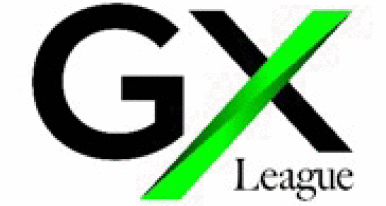
Environmental impact and efforts in business operations

- *1 [Scope of aggregation] Iwata Plant, Kosai Plant, Osuka Plant, Sagara Plant, Hamamatsu Plant, and Tooling Dept. (PRTR substance includes output at the head office, Ryuyo Proving Grounds, Marine Technical Center, Shimokawa Proving Grounds, Sagara Proving Grounds, but excludes output at Tooling Dept. Ozonedepleting substance includes output at domestic offices of Suzuki Motor Corporation.)
- *2 Calculated based on emission coefficients under Japan’s Mandatory Greenhouse Gas Accounting and Reporting System (Electricity is based on basic emission coefficients for each electricity provider.)
- *3 CO2 emissions are for five plants: Iwata Plant, Kosai Plant, Osuka Plant, Sagara Plant and Hamamatsu Plant.
- *4 As for ozone-depleting substance, the refrigerant R-22 (chlorodifluoromethane) was extracted from the total results based on the Act on Rational Use and Appropriate Management of Fluorocarbons (Fluorocarbon Emissions Control Act).
- *5 The ozone depleting potential is based on the Act on the Protection of the Ozone Layer Through the Control of Specified Substances and Other Measures (Ozone Layer Protection Act).

 Japan
Japan
